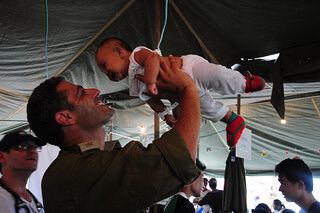Iranian Atomic Urgency

• Prince Alwaleed bin Talal shared some insight in the Saudi royal family’s thinking on the Iranian issue. He told Jeffrey Goldberg:
If the negotiations don’t succeed — and clearly, Alwaleed sees no chance of success — then what? Anti-proliferation by force? I asked him if he thought the Arab states would actually back an Israeli strike on Iran’s nuclear facilities, if this terrible option should come to pass.
“Publicly, they would be against it,” he said. “Privately, they would love it.”
What about at the level of the so-called Arab street?
“The Sunnis will love it,” he said, referring to the dominant branch of Islam, to which most Arab Muslims adhere. “The Sunni Muslim is very much anti-Shiite, and very much anti-, anti-, anti-Iran,” he said.
You’re sure they loathe Iran more than they loathe Israel?
“Look, Iran is a huge threat, historically speaking,” he said. “The Persian empire was always against the Muslim Arab empire, especially against the Sunnis. The threat is from Persia, not from Israel . . . .”
• After Ayatollah Ali Khamenei called Israel a “rabid dog,” Israel was disappointed with the belated milquetoast “condemnation” from the US. See Jerusalem Post coverage and Boaz Bismuth‘s take from Geneva.
• Azerbaijan arrested an Iranian allegedly plotting an attack on Israel’s embassy in Baku. More at the Jerusalem Post.
• Elliott Abrams and Jennifer Rubin rail on Tom Friedman’s dual loyalty accusation.
• For more commentary/analysis on the Iranian interim agreement, see Aaron David Miller, Boaz Bismuth, David Ignatius, Max Boot, Frida Ghitis, Uri Friedman, and the NY Times.
Rest O’ the Roundup

• Israeli soft power in the Philippines continues sparking impressive headlines. The medical team at the IDF field hospital restored eyesight of blind Philippines residents; also, Julie Pearce, a Minnesota nurse became the first non-Israeli member of the field hospital. She shared her story with the Duluth News-Tribune.
These specialists are also offering treatment for chronic conditions that the rural health system here would never have been able to support. A woman with stage 4 breast cancer that was eating through her breast tissue had a mastectomy performed. A man’s mouth tumor was treated and much more. These lives saved may, in a small way, offset some of those tragically lost. For a patient pre-typhoon, these would all be fee-based hospital visits; fees that most in a lifetime would never be able to afford.
• Egypt and Turkey downgraded ties after expelling each others’ ambassadors.
• Lebanese media filled in more details about the Palestinian suicide bomber who attacked the Iranian embassy last week.
The Lebanese media network LBC International named him as Adnan Moussa Mohammad from the Ain al-Helweh refugee camp, the largest in Lebanon. . .
The suspect’s link to Sheik Ahmad al-Assir, known for his fiery sermons denouncing Iran’s Lebanese Shi’ite ally Hezbollah, is likely to increase already taut tensions between the country’s two largest Muslim sects.
The second bomber was identified as Lebanese national Mouin Abu Daher.
• According to NOW Lebanon, “corruption, fraud and religious bickering keep aid away from Syrian refugees.”
(Image of Beirut via YouTube/euronews, Western Sahara via Wikimedia Commons, Alwaleed via YouTube/CBS This Morning, Philippines via Flickr/Israel Defense Forces)
For more, see Thursday’s Israel Daily News Stream.
[sc:bottomsignup]
